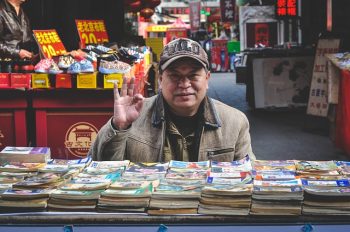Useful Vocabulary for Shopping in China Posted by Ayana on Oct 21, 2019 in Vocabulary
When visiting China it is so tempting to go shopping. Every item I buy bears memories from another delightful trip in The Middle Kingdom.
买东西 (mǎi dōng xī) is a general phrase (verb + object) that literally means to buy things. It is a useful phrase, referring to almost any kind of shopping. I use this phrase all the time. When going to the nearest store wearing pajamas to buy 苏打饼干 (sū dǎ bǐng gān, famous Chinese crackers), or when meeting a friend on the main street (大街 dà jiē) to search for new clothes.
When dividing the phrase 购物 (gòu wù) to verb and object, the same literal meaning is presented – to buy things. 购 and 买 are both verbs that mean to buy; 物 and 东西 are both nouns that mean things. But while 买东西 is a spoken language, 购物 is a much more elegant way of speaking.
买东西 and 购物 both involve spending money 花钱 (huā qián), as one would expect from shopping. Another Chinese phrase that means shopping – 逛街 (guàng jiē) – doesn’t necessary include money 不一定要花钱 (bù yī dìng yào huā qián). 逛街 literally translated to loiter on the street, and it’s used as the Chinese equivalent for window shopping. For me, as a foreigner, 在中国逛街很有趣 (zài zhōng guó guàng jiē hěn yǒu qù, going window shopping in China is very interesting). I enjoy exploring the variety of shops and stalls, taking in the Chinese street views and smells, and even picking up snippets from people’s conversations.
If you do 买东西 or 购物 expect to 花钱. Every item has a price (价格 jià gé, or, 价钱 jià qian), and every seller wish to make a profit (赚钱 zhuàn qián). But customers (顾客gù kè, or, 客户kè hù) always wish to pay less. Haggling over the price (讨价还价 tǎo jià huán jià) is common in China. The Chinese language has many verbs that mean to negotiate the price: 议价 yì jià, 讲价 jiǎng jià, 砍价 kǎn jià.
When entering an independently owned business in China you should feel free to bargain. Useful sentences to start the bargaining process, and to express your dissatisfaction with the high price, can include:
- 太贵了!
Tài guìle!
Too expensive!
- 别宰我!
Bié zǎi wǒ!
Literally means don’t slaughter me, but when talking about buying and selling it is used as slang to overcharge. It can be used in many ways. When I went shopping with my friend the other day, for example, I asked the seller: 这条裤子多少钱? (zhè tiáo kù zi duō shǎo qián?, how much for these pants?). After he answered, I immediately turned to my friend and said: 他想宰我 (tā xiǎng zǎi wǒ, he wish to slaughter me).
If you are not used to bargaining don’t worry. It requires practice to become a good bargainer. Keep on trying and before you know it you will be good at it. When I first came to China I didn’t know how to bargain 我刚来中国的时候我不会讲价 (wǒ gāng lái zhōng guó de shí hòu wǒ bù huì jiǎng jià).). Today I’m pretty good at it 我会砍价 (wǒ huì kǎn jià). After negotiating with the pants seller, for example, I reduced the cost by twenty-five RMB 我砍掉了二十五块钱 (wǒ kǎn diào le èr shí wǔ kuài qián).
So, visit China and go shopping!
Text vocabulary
买东西 mǎi dōng xī = to shop; to buy something .
购物 gòu wù = go shopping
逛街 guàng jiē = to loiter on the street
花钱 huā qián = to spend money
价格 jià gé = price
价钱 jià qian = price
赚钱 zhuàn qián = to make a profit
顾客 gù kè = customer
客户 kè hù = customer
讨价还价 tǎo jià huán jià = to haggle
议价 yì jià = to negotiate a price
讲价 jiǎng jià = to bargain
砍价 kǎn jià = to slash prices when bargaining
贵 guì = expensive
多少钱 duō shǎo qián = how much does it cost
宰 zǎi = to slaughter, to overcharge
会 huì = to be able to
块钱 kuài qián = Yuan, RMB
大街 dà jiē = main street
有趣 yǒu qù = interesting
好好学习,天天向上!

Build vocabulary, practice pronunciation, and more with Transparent Language Online. Available anytime, anywhere, on any device.





Leave a comment: